

During the course of the Second World war, more than 400,000 German POWs were interned in 511 prisoner of war camps in the U.S. The largest, Camp Aliceville in Alabama, housed more than 6,100 POWs and employed more than 1,000 American military and civilian personnel. Aliceville is the primary setting for our story, thanks to a remarkable archival collection recently shared with the Ohio County Public Library.
James Malcolm Jacobs of South Wheeling served in the U.S. Army during the Second World War and in the Reserves until 1949. As part of his service, Pvt. Jacobs was with the 436th Military Escort Guard Company stationed at “Camp Aliceville,” a German prisoner of war (POW) camp located in Aliceville, Alabama. He transported prisoners throughout the American South and ran the movie projector for the camp. Jacobs’s grandson, Josh Jacobs, inherited his grandfather’s collection, which he has loaned for a display at the Ohio County Public Library. When the display closes, the material will be donated to the Aliceville Museum.
The 436th Military Police Escort Guard Company was first activated by the Provost Marshall General of the United States on Feb. 25, 1943 at Fort Custer Michigan. The 436th's chosen motto was "We Police for Peace." The primary mission was guarding and escorting prisoners of war, but the men also received ready combat training. By March of 1943, First Lieutenant (promoted to Captain a few months later) Joseph A. Dionne was made permanent company commander. The Company was divided into four sections with a sergeant in command of each. 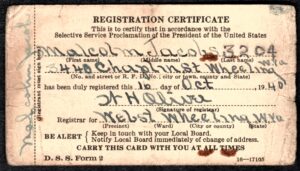 Pvt. Jacobs's selective service card from 1940.
Pvt. Jacobs's selective service card from 1940.
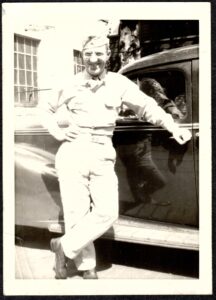 This undated photo of Pvt. Jacobs was taken while he was on leave in Wheeling.[/caption] Most company recruits, including Pvt. James M. Jacobs, were sent to Fort Custer from Fort Hayes in Columbus, Ohio. Unlike typical raw recruits, most of these men were older (avg. age 28) married men with established careers and skill sets. These included office workers, shop foremen, farmers, two professional entertainers, and an engineer. Pvt. Jacobs, for example, was a 29 year old married (Jane) machine operator and truck driver who lived at 3440 Chapline Street in Wheeling. All were recruited through selective service and underwent basic training, which included specialized military police training, at Fort Custer. All were, at minimum, qualified as rifle marksmen when training was complete. Several gained the rank of sharpshooter. Military police training included firing of the "Thompson sub-machine gun, automatic pistol, the carbine, and the 12-gauge riot-type shotgun, instruction in the guarding of prisoners, Judo training, practice in interior guard, and instruction in the rules of land warfare governing treatment of prisoners of war, conduct on town patrol, [and] conduct on riot duty..." [Company History.] After seven weeks of basic training, the Company was sent to Fort Devens, Massachusetts on an emergency mission to escort a large group of newly arrived German prisoners of war by train from Boston Harbor to Camp McAlester, an interment camp in Oklahoma. The 436th then returned to Fort Custer. In a letter to his father Zack, Pvt. Jacobs, a German-speaker, offered this description of the German prisoners he encountered on the mission:
This undated photo of Pvt. Jacobs was taken while he was on leave in Wheeling.[/caption] Most company recruits, including Pvt. James M. Jacobs, were sent to Fort Custer from Fort Hayes in Columbus, Ohio. Unlike typical raw recruits, most of these men were older (avg. age 28) married men with established careers and skill sets. These included office workers, shop foremen, farmers, two professional entertainers, and an engineer. Pvt. Jacobs, for example, was a 29 year old married (Jane) machine operator and truck driver who lived at 3440 Chapline Street in Wheeling. All were recruited through selective service and underwent basic training, which included specialized military police training, at Fort Custer. All were, at minimum, qualified as rifle marksmen when training was complete. Several gained the rank of sharpshooter. Military police training included firing of the "Thompson sub-machine gun, automatic pistol, the carbine, and the 12-gauge riot-type shotgun, instruction in the guarding of prisoners, Judo training, practice in interior guard, and instruction in the rules of land warfare governing treatment of prisoners of war, conduct on town patrol, [and] conduct on riot duty..." [Company History.] After seven weeks of basic training, the Company was sent to Fort Devens, Massachusetts on an emergency mission to escort a large group of newly arrived German prisoners of war by train from Boston Harbor to Camp McAlester, an interment camp in Oklahoma. The 436th then returned to Fort Custer. In a letter to his father Zack, Pvt. Jacobs, a German-speaker, offered this description of the German prisoners he encountered on the mission:
"Our prisoners were mostly Germans. There were some Italians. Hitler's crack troops were these. All ages -- 17 to 35. Hard as nails, brown and clean cut. They were seemingly gentle and mannerly. Many of them spoke English. They adhered to all the rules and regulations and kept themselves well shavened [sic] and well washed. I didn't see one there without a comb, handkerchief and tolit [sic] articles. They never missed a thing inside the car or out, and many of them knew exactly where they were in our Country. When we crossed the Mississippi River, one of them caught my attention (which wasn't hard) and asked me -- 'Missouri River?' I said 'No, Mississippi.' -- He said then 'St. Louis?'--I said 'Yeah. East St. Louis.' You could tell they knew their maps but they just couldn't get used to the bigness of this U.S.A. I asked one boy what he thought of America. He wasn't very talkative but he did say--'ok.' said there wasn't much difference in the people. (Cause he hasn't seen anyone, only us)--Started to say something about 'War--no good.' I agreed and said that war wasn't good for anyone. Real quick he said 'But we need Russia, Germany doesn't have enough room, Russians no dam [sic] goot.' -- I could only make out half of what he was saying so I didn't detain him any longer than it took to get a drink of water."
The 436th was also called to police a "race riot" in Detroit, but fortunately, were never actually employed. A common occurrence in Jim Crow America (and after), so-called race riots were typically tools of oppression defined by often extreme violence used by whites to oppress African Americans, not just in places like Tulsa, Oklahoma but all over the country, including northern cities like Detroit and Chicago. Troops were often deployed, ostensibly to quell the violence. But during the segregated military era, one can surmise the typical result. See, for example, the 1919 "Red Summer." As for the 436th on this occasion, despite not actually being used to stop the violence, the men did learn to live "out of their helmets" while staying in a "tent city" for a few days. Overall, the 436th did itself proud at Ft. Custer, receiving numerous commendations and being given the honor of leading several regimental parades.
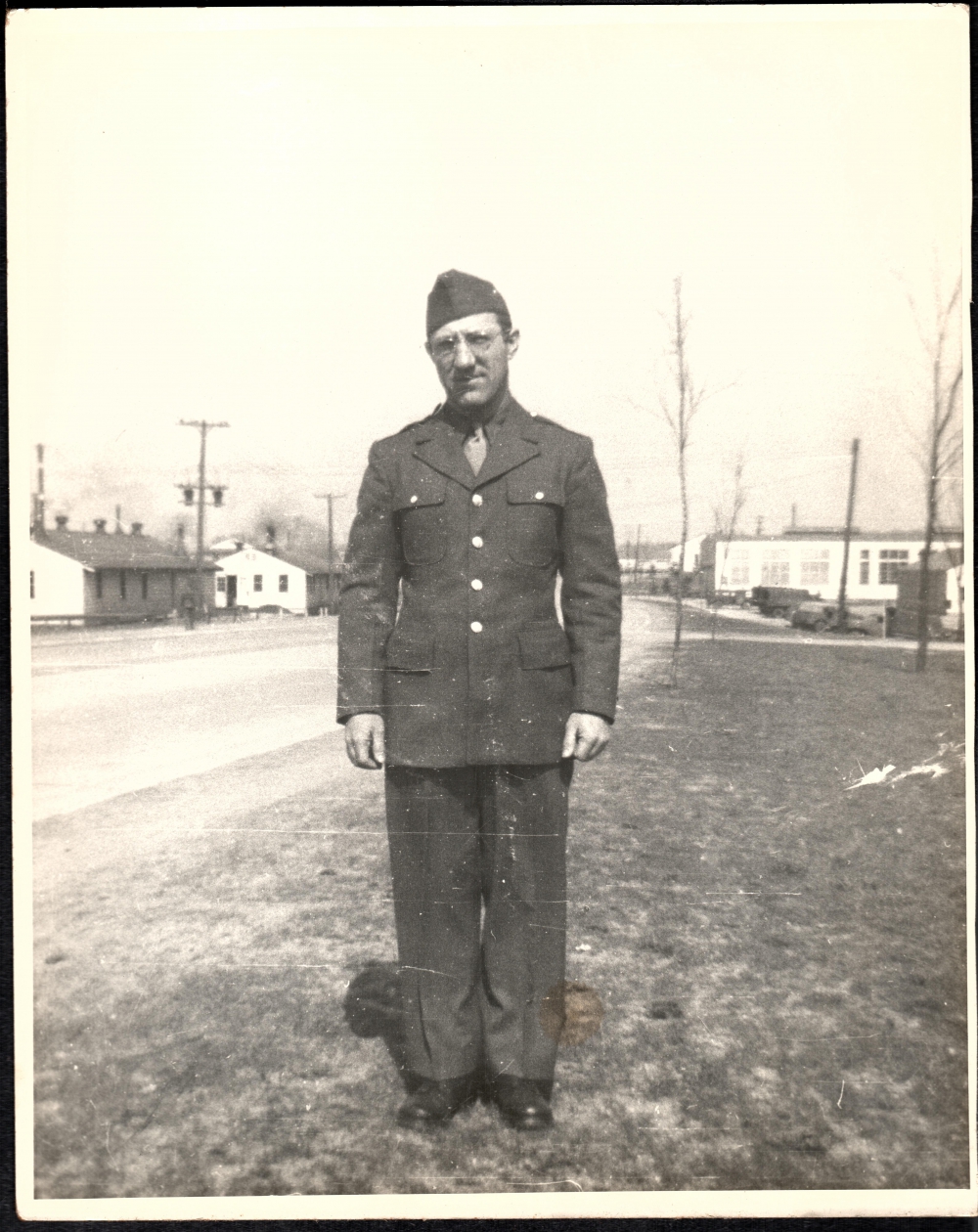 On July 1, 1943, the 436th departed by train for Aliceville, Alabama, arriving two days later. Aliceville, population 1,300 was the All-American small southern town of the 1940s, offering mules and wagons, general stores, a pool room, Friday night lights, two "moving picture theaters," and a bowling alley. The 436th took up residence at the newly minted Aliceville Internment or Prisoner of War Camp under the command of Lt. Col. William Waite, where they merged with a few other Companies. Camp features included "a post theatre (where Pvt. Jacobs would end up working as the projectionist); a main post exchange...: an Officer's Club; a Non-commissioned officers' Club, a large Enlisted Men's Recreation Hall; a Station Hospital with a separate dispensary...adequate barracks, and quarters for the officers and enlisted men, and numerous warehouses and other maintenance buildings." A lot of the construction was done using prisoner labor. Fortifications included ten guard towers, a double barbed wire fence, powerful search lights, sirens, and machine guns. The camp phone directory provides further insights into the camp structure, facilities, and staffing.
On July 1, 1943, the 436th departed by train for Aliceville, Alabama, arriving two days later. Aliceville, population 1,300 was the All-American small southern town of the 1940s, offering mules and wagons, general stores, a pool room, Friday night lights, two "moving picture theaters," and a bowling alley. The 436th took up residence at the newly minted Aliceville Internment or Prisoner of War Camp under the command of Lt. Col. William Waite, where they merged with a few other Companies. Camp features included "a post theatre (where Pvt. Jacobs would end up working as the projectionist); a main post exchange...: an Officer's Club; a Non-commissioned officers' Club, a large Enlisted Men's Recreation Hall; a Station Hospital with a separate dispensary...adequate barracks, and quarters for the officers and enlisted men, and numerous warehouses and other maintenance buildings." A lot of the construction was done using prisoner labor. Fortifications included ten guard towers, a double barbed wire fence, powerful search lights, sirens, and machine guns. The camp phone directory provides further insights into the camp structure, facilities, and staffing.
Camp prisoner capacity was 6,000, which was reached by September 1943. According to the Co. History, "All of the prisoners were Germans, captured in the North African Campaign" where the German expeditionary force in North Africa was infamously commanded by Field Marshal Erwin Rommel. 
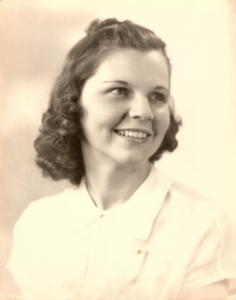 Descended from German immigrants, Pvt. Jacobs spoke German. He translated the song lyrics for a song entitled "We Stand for Germany" for his wife Jane in a letter home. He wrote: “Jane. This is the song the Germans sing while they march. It’s really beautiful the way they sing it— all having harmonious voices.”
Descended from German immigrants, Pvt. Jacobs spoke German. He translated the song lyrics for a song entitled "We Stand for Germany" for his wife Jane in a letter home. He wrote: “Jane. This is the song the Germans sing while they march. It’s really beautiful the way they sing it— all having harmonious voices.”
According to another letter to Jane, one of the German POWs, Paul Berger, wrote the note below and sent the flower “to Mrs. Jacobs in thankfulness. ..he appreciates and is thankful that I have treated him so kindly — nicely.” Among the artifacts from German POWs Pvt. Jacobs brought home were a tile (“made by German POW” written on obverse); a uniform insignia; a German cigarette pack; Greek currency; and the “Afrika Korps” armband seen above.
Early on at Aliceville, the 436th found itself spending a lot of time "chasing prisoners." As expected, the men also served guard duty at the various gates and sensitive facilities inside camp while also providing security by accompanying prisoners on work excursions outside the camp, such as cotton-picking and wood cutting. The 436th also continued its "advanced training functions" at Aliceville, including bomb reconnaissance, firing of a 1903 .30 caliber rifle, carbine training, and a combat infiltration course under live fire. The company was also sent on special missions such as guarding prisoners at temporary prisoner of war camps and escorting prisoners during transfers from one camp to another. Pvt. Jacobs was a certified truck driver for these missions. In fact, the collection contains several maps and postcards Pvt. Jacobs accumulated while transporting POWs all over the American South and elsewhere. His Motor Vehicle Operator’s Permits show that he was authorized to drive cargo trucks in addition to cars.
The collection also includes a wide assortment of menus from all over the country collected by Pvt. Jacobs during these missions. Many contain pro-military slogans like “U.S. Needs us Strong. Eat Nutritional Food.” When train transport was required, a unique set of rules applied. The collection contains an interesting list of “Train Rules” governing German POWs, which includes “no spitting”; “a courteous and respectful attitude toward all United States personnel”; “no loud noise or boisterousness” (singing with permission); and “no alcoholic beverages or gambling.” According to the Company history, during these transport missions, no prisoners were lost and no escapes were attempted. The history was written after the company existed for about one year, so probably in early 1944. In December of that year, Pvt. Jacobs became one of numerous men of Co. 436 to be awarded the "Good Conduct Medal" for demonstrating "fidelity through faithful and exact performance of duty, efficiency through capacity to produce desired results and...behavior...to deserve emulation."
In December, 1944, Pvt. Jacobs was granted an industry work furlough to act as a U.S. Army Ordnance (ammunition) Representative at the National Tube Company in McKeesport, PA, about 12 miles from Pittsburgh. He was commended for his excellent work and exemplary conduct (he was said to be "an inspiration to the civilian workers in the plant"), and his work furlough was extended through April 1945. Back at Aliceville on September 19, 1945, Pvt. Jacobs received a Western Union Telegram informing him that his son—who would also be named James—had been born. This item is special to grandson Josh Jacobs, who says it brought him an instant connection to both his father and grandfather. 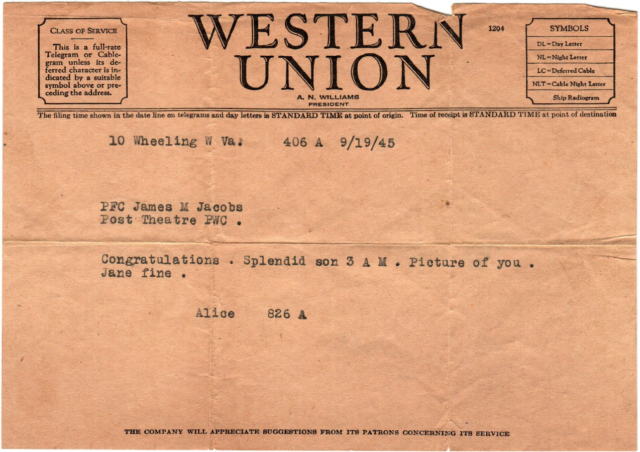
![]() On an October 1945 furlough request form, Pvt. Jacob's hand wrote, "This is the furlough I had ready in Sibert when I was shipped" -- Jacobs had been ordered to transport enlisted men to Camp Sibert ( a chemical warfare training center) in late September. Under "Reason for Requesting Furlough" he wrote, "Visiting Family - New Addition." After the war, Pvt. Jacobs enlisted in the Reserves, serving until April 1949, when he was honorably discharged.
On an October 1945 furlough request form, Pvt. Jacob's hand wrote, "This is the furlough I had ready in Sibert when I was shipped" -- Jacobs had been ordered to transport enlisted men to Camp Sibert ( a chemical warfare training center) in late September. Under "Reason for Requesting Furlough" he wrote, "Visiting Family - New Addition." After the war, Pvt. Jacobs enlisted in the Reserves, serving until April 1949, when he was honorably discharged.
One of the most endearing aspects of the James M. Jacobs Collection is a series of poems, presumably composed by Pvt. Jacobs, including this one, entitled, “G.I.”, which was seemingly dedicated to his wife Jane (like most of his poems). It ends with the line, “Glad am I, you’re not G.I…” 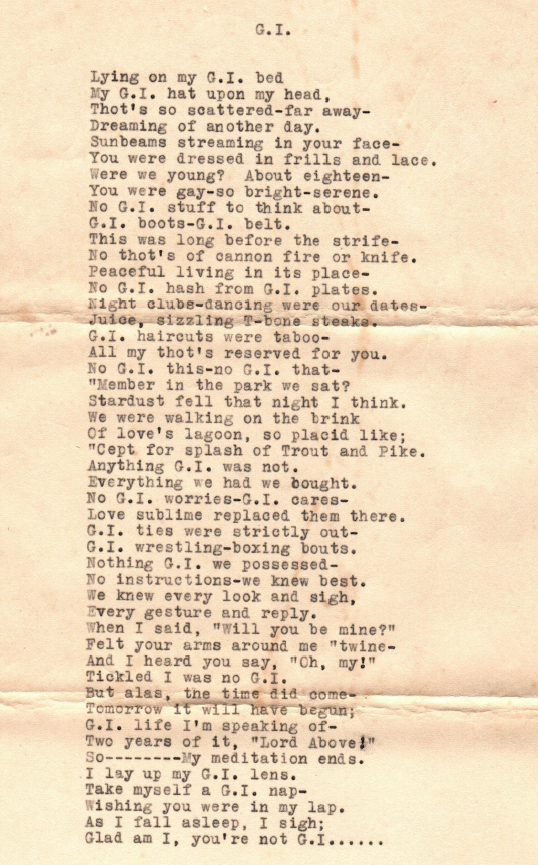
James Malcolm Jacobs died on November 8, 1992 and his wife Jane followed on October 21, 2003. They are buried side by side at Greenwood Cemetery.
Ancestry.com database. Accessed through ohiocountylibrary.org.
"Company History, The 436th Military Police Escort Guard Company." (unknown author; 1943-44). James M. Jacobs Collection, Ohio County Public Library Archives.
James Malcolm Jacobs Collection. OCPL Digital Archives. Krammer, A. Nazi Prisoners of War in America. 1996.
Wheeling Intelligencer, 1943-1946.
Wheeling Intelligencer, Nov. 9, 2023.
Wheeling News-Register, 1943-1946.
© Copyright 2025 Ohio County Public Library. All Rights Reserved. Website design by TSG. Powered by SmartSite.biz.